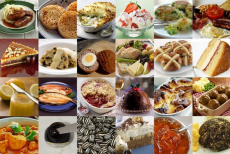
When you think of British food, you might think of roast dinners, fish and chips, Yorkshire puddings and lots of meaty stews. But did you know you can also include food from other countries, which has been changed and adapted to suit British tastes? Because of all the countries that have invaded Britain, and because of all the countries Britain has invaded, the British food scene could possibly be one of the most diverse in the world. Walk down your local high street, you’ll probably see a kebab shop, an Indian takeaway, a Chinese takeaway, and probably a few restaurants from Italy, Thailand and maybe even Lebanon.
Of course, it wasn’t always this way. Can you imagine Britain before the importation of potatoes, wine, tomatoes and even tea? Sounds like a nightmare! However, it wasn’t as bad as you might think. The Romans brought over improved farming techniques, which were a significant improvement on what went before. The land could be used to produce better quality things, which benefitted ordinary people. The Romans also brought herbs with them, and afterwards many Anglo-Saxon people begun to stew their meat with the herbs before the rest of the continent caught on to its deliciousness.
After the many invasions of Britain in the Middle Ages, Britain managed to establish itself as an international sea power. Because Britain often went to Asia and Africa, it had a role in the spice trade, many of which (like pepper) were brought back to Britain and used by cooks to make tastier dishes. By this time, Britain had a reputation of stodgy and heavy food, which is still prevalent today. After Britain had colonised parts of America, and after Catholicism was essentially replaced by Protestantism, no-frills, simple and nutritious food came back into fashion.
But as the Empire grew stronger, food in Britain became more diverse. Tea from China was imported in the 1600s, and at first, it was the drink of the very wealthy. Britain partly got around this by producing tea in India, part of the Empire (unlike China), so it could be produced more cheaply. Can you imagine life without tea? I certainly don’t want to!
Britain’s heavy involvement with India meant the British people living there got more involved in local life. Many of these people had Indian servants, including Indian cooks. Indian-style food became very popular, as the British colonial agents brought it back to Britain. The first Indian restaurant in the UK was opened in 1809, and since then many dishes like Chicken Tikka Masala and other Balti curries have been invented in Britain.
The reason that British food abroad has such a bad reputation is partly due to the rationing of the Second World War, which finished a decade after the war itself had ended. This had a profound and long-term impact on the British diet, but recently food from Italy, India, China, Arab countries and many, many more have been introduced into supermarkets. Think frozen pizza, spaghetti, spices, and exotic fruit and veg – all of this has only been recently available to average people.
Perhaps because there’s never really been a proud tradition of “British food”, unlike places like France, the food market has been a little more open to different foods from around the world. This has benefitted all of us, as it means we have a far more varied taste. Next time you walk past a foreign restaurant, just remember that, and then think about what Britain would have been like if we’d never been invaded – yuck! Diet of oats and rabbit, anyone?
Image from: http://www.sporcle.com/games/triplet_3/more-british-foods

0 Comment:
Be the first one to comment on this article.